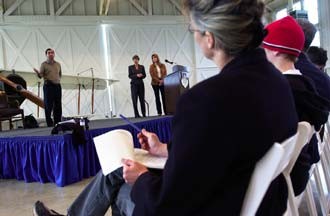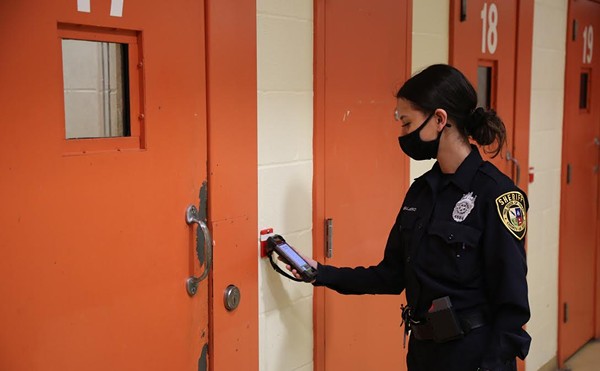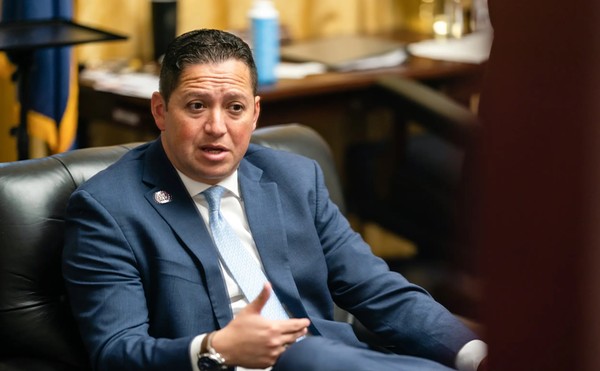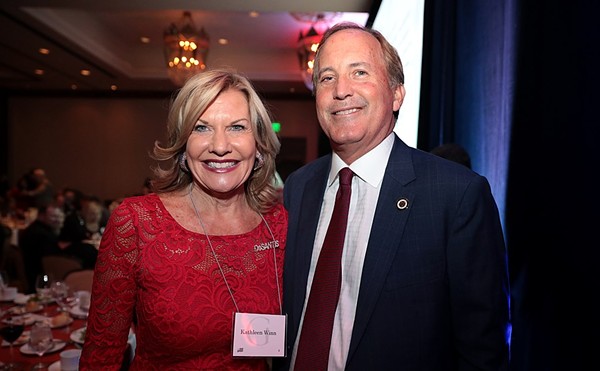|
Charter school proposed for Brooks City-Base There were 150 or so chairs set up for a February 5 public hearing about a proposed charter school at Brooks City-Base, but only a dozen people to fill them. Nonetheless, organizers, which include the Florida-based charter Somerset Academy, Brooks City-Base Foundation, and the Brooks Development Authority, hope they will receive approval this year from the Texas Education Agency to launch Texas' 201st charter school, and Bexar County's 23rd. Yet, the tentatively named Science and Technology Charter is being floated during a time when charter schools are undergoing intense scrutiny, particularly in Texas. Last year, led by Education Commissioner Shirley Neeley, the state enacted new rules governing charter schools because many were falling short of their student performance goals. Nationally, while the Bush administration supports charter schools, public and private, the idea is seen as controversial by traditional public school proponents, who point to studies suggesting charter students fare no better than their public school counterparts. George Pedraza, a former member of the BCBF and the BDA, acknowledged to the small crowd that the perception of charter schools is mixed. "It's safe to say for the sake of education, accountability is critical." About 18 months ago, the Bill and Melinda Gates Foundation, which has helped fund many charter schools throughout the United States, approached the BDA about starting a charter on base. At Brooks, the foundation saw many of the same characteristics as those at High-Tech High School in San Diego, Pedraza said. High-Tech is located on a former naval base and has a science- and math-intensive curriculum. "We thought it was a fantastic idea," said Cyndy Hanson, information technology manager for the BDA. Students could mentor with military and civilian researchers; meanwhile, the BDA is courting business tenants for the 1,300-acre property to fit in with the City-Base vision. "It seemed like a natural fit." Last year, the BCBF submitted a charter school application to the Texas Education Agency. After Pedraza proposed partnering with Somerset and its management company, Academica, the Foundation changed its application. Since the application changed horses in midstream, the TEA denied it. The new application is due later this month; the TEA will hold interviews for prospective charter-holders in August. If granted a charter, the school could open as early as the fall of 2006. Hanson said the school might be built on the southeast side of the base. Initial construction costs, not including the land, are estimated at $3.5 million. The school would have an open enrollment policy, meaning that any child within 30 miles of Brooks could apply for one of 400 available slots. If more than 400 students apply, the school would hold a lottery and start a waiting list. As a public charter school, it would receive federal money, including $150,000 in startup funding over its first three years. Like traditional public schools, the school would receive a per-pupil allowance from the state; it could also receive grants. The Gates Foundation has yet to commit any funds to the proposed school. Ten percent of the nation's charter schools have closed since the first one opened in Minnesota in 1992. Ruth Jacoby, governing board chairperson of Somerset Academy, says a "good governing board and management company" can help a charter avoid failure. "Sometimes there can be an educator but he or she's not a business person," she added. "Or they hire the wrong principal." Like Somerset, which has charter schools in Florida and Utah, the school would have a principal hired by the governing board, which functions roughly like a school board. The governing board answers to the for-profit management corporation Academica, based in Florida. According to 2003 tax forms, Somerset Academy paid Academica $400,000 for management services. Academica charges on a per-student basis. The school, which has students from pre-K to 11th grade, generated $5.7 million in revenue, $5 million from government grants. It reported $5.5 million in expenditures. Jacoby earns $85,000 annually as the school's director. Governing board members are not paid. Former Democratic Florida Congressman Peter Deutsch is on the board; according to the Center for Responsive Politics he received at least $13,000 in campaign contributions from Academica owner Fernando Zulueta and other people associated with the management company. At the hearing, Jacoby emphasized the school's "project-based curriculum," which allots five teachers per 100 students and includes mentoring. "The curriculum is working on real-world problems," she said. "Each teacher will have responsibility for the kids. Hopefully kids won't fall through the cracks. It will help monitor academic progress." Teachers would be required to have a four-year college degree; teacher salaries would be comparable to those at a traditional public school. Last year, Texas charter schools came under scrutiny; 28 faced sanctions. Of the 236 charters granted since 1996, 5 percent of them have been revoked. "Some charter schools didn't focus on special-needs students," says Hanson. "They need to provide an atmosphere where all kids can learn." Education Week reported that in 2004, at least two national studies, including the 2003 National Assessment of Educational Progress, showed that fourth-graders attending charter schools performed more poorly in math than their regular public school counterparts. That gap disappears when race and ethnicity is considered. The trade magazine cited another study that examined data for 6,500 charter school students and 376,000 traditional public school students in the U.S. It found that charter school children taught by teachers with four years of experience or less performed worse in reading and math than students in regular public schools with similarly inexperienced teachers. The study found students at charter schools were more likely to have inexperienced teachers. Jacoby said all teachers at the proposed school would be "highly qualified" and have four-year degrees, but she did not elaborate on their experience level. She said that overall, charter schools are "doing better or equal" to traditional public schools. "You need to examine why parents want charter schools. It could be safety issues or codes of conduct. That's what parents are facing when they make a choice." Since Somerset Academy hasn't yet had its first graduating class, it has no graduation rate. In the 2003-04 academic year, its elementary and middle schools received an A, the highest mark, by the Florida Department of Education. Its high school received a B. Of Bexar County's 22 charter schools, six were determined to need improvement based on performance in the 2003-04 school year. The remaining 16 met the federal Average Yearly Progress standards. Jacoby said the proposed charter would "work with the community at-large," including the Air Force and private businesses that could offer internships to students. "It's a marriage with the community." • By Lisa Sorg
|
Tags:

KEEP SA CURRENT!
Since 1986, the SA Current has served as the free, independent voice of San Antonio, and we want to keep it that way.
Becoming an SA Current Supporter for as little as $5 a month allows us to continue offering readers access to our coverage of local news, food, nightlife, events, and culture with no paywalls.
Scroll to read more San Antonio News articles
Newsletters
Join SA Current Newsletters
Subscribe now to get the latest news delivered right to your inbox.

















